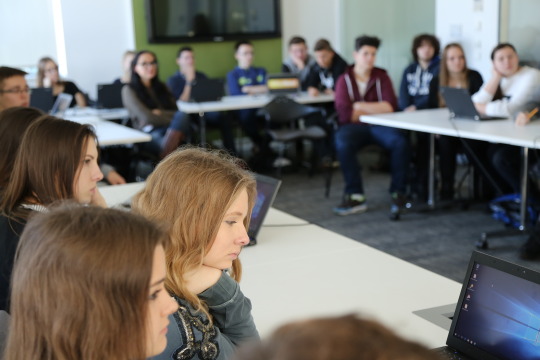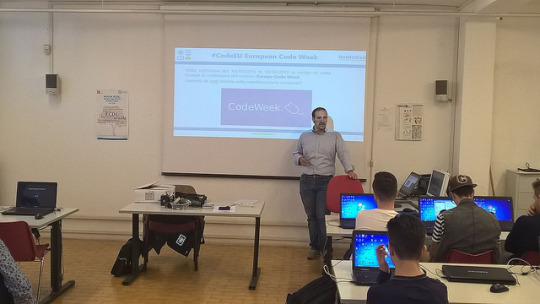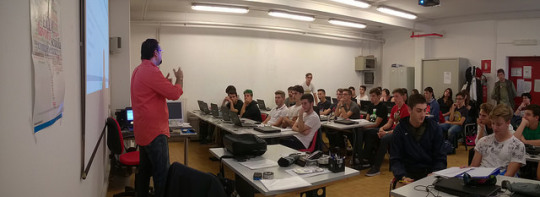European telecentres celebrate EU Code Week
Publication date: October 17, 2016
Today’s society and economy are constantly changing due to the advances of technologies and coding and programming skills are becoming more and more necessary. Coding not only improves people’s employability in modern economy sectors, but it also helps develop valuable life skills like logical thinking, collaborative teamwork, problem-solving skills and creativity, and it can be a fun activity as well.

With this in mind, European telecentres and other non-profit organizations working in the ICT field are becoming pioneers in promoting coding and programming as tools to achieve digital inclusion, applying a social vision to teaching these skills. But first of all, what is a telecentre? A telecentre is a public space where everyone can use computers and the Internet and learn digital skills at any level. It can be a community centre, an NGO, a library or a school.
Telecentres offer various activities in the area of coding: coding workshops for teenagers, coding and programming training courses for educators and trainers, social hackathons and other events.

Many of them offer coding activities during EU Code Week 2016. The Hellenic Professional Informatics Society (HePIS) organizes seminars for unemployed youngsters on Website Development (HTML, CSS and JavaScript) as well as training programs to become Junior Full Stack Developers and Soft Skills courses to develop communication, presentation and initiative skills. Likewise,
the Catalan network PuntTIC offers a training course for e-facilitators and trainers on coding and robotics (Scratch, Arduino and LittleBits). The Catalan foundation Esplai, for its part, caries out workshops on videogames creation, robotics and app creation addressed to children and family, as well as an app contest. In Italy, Fondazione Mondo Digitale, expects that the girls participating in its project CodingGirls will contribute as coding ambassadors to raise awareness on STEM and gender equality in this field. Moreover, the Cyprus Computer Society offers free admission seminars on Coding and robotics both for educators and for students and also interactive workshops for parents, students and teachers together.
Telecentres play a significant role in promoting coding and programming skills outside the specialized industry and formal education. They engage prospective learners and code creators beyond the usual suspects, including kids, youngsters, immigrants and women with disadvantaged background, early school leavers, those at risk of exclusion or from rural areas; people who otherwise don’t have access to computers or at least don’t have the means and tools to develop digital and coding skills. Telecentres offer a non-formal environment for the training courses and workshops, fostering creativity and fun.
Based in local communities, telecentres reveal the social potential of coding by teaching it in a context. For example, coding to create a game can be used to tackle issues related to the target groups’ own lives and neighbourhoods. In this way, disadvantaged groups can make their problems and needs more visible, understand others and create solutions, defeating prejudices and fostering
social cohesion and citizenship.
Based on this concept, the Belgian organization MAKS vzw, has carried out the initiative Capital Digital, which is among the 10 semi-finalists (out of 1056 applicants) of the European Social Innovation competition 2016. In Capital Digital, young migrants and asylum seekers from the poorest neighbourhoods of Brussels are trained in technical and pedagogical skills to teach coding and programming to their younger peers in a playful and didactic way. “This first work experience will enhance the youngster’s confidence to choose a fitting career and to find a job. […] The project also encourages young children to enjoy and enhance their IT skills, which are becoming increasingly important in our competitive society. Moreover, Capital Digital helps children to grow from consumers to creative producers: it is fun to play games, but it is even more exciting to make your own game.” says MAKS Director Veronique de Leener.

In another training course, young migrants and local elderly people come together to create a game about a better-shared neighbourhood. Coding, intergenerational dialogue and digital storytelling come together to create an atmosphere of trust and understanding otherwise missing from their everyday interactions.
There are many great initiatives on teaching coding in an alternative, fun and creative way. At our telecentres, we add one more ingredient – social purpose. Now go to the map and find us in Belgium, Lithuania and many other locations.
Gabriela Ruseva
Policy and Communications Officer
Telecentre-Europe AISBL


